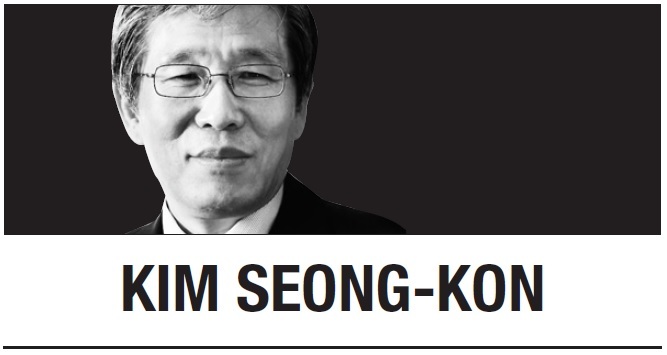[Kim Seong-kon] The society that induces us to become a snitch
By Kim Seong-konPublished : March 31, 2021 - 05:30

Embarrassingly, however, it does not seem to be the case in South Korea. Even the government encourages the people to inform against others and rewards them with money. In fact, there are numerous informant reward systems for snitches in Korea. For example, if you submit a photo of someone who throws a cigarette butt in the street, you will receive reward money. If you spot and report a drunk driver, illegal garbage disposal, or management fraud at nursery schools, you can request reward money, too. If you report on a store that sells cigarettes to minors, a bar that admits teenagers, or a shop that does not issue a receipt, you can have reward money, as well.
The Korean government also gives reward money to those who take photos of cars that violate traffic laws and submit them to the authorities. Koreans call them “carparazzi,” a coinage derived from paparazzi, a word for aggressive tabloid reporters who intrude on people’s affairs. “Paparazzi” is from an Italian slang for “buzzing mosquito.” In fact, some people cruise around all day to find illegally parked cars, or vehicles making illegal left-turns and U-turns, just so they could receive the promised reward money. According to newspaper reports, carparazzi report approximately 57,000 cases of illegal parking each year in Korea. Sometimes carparazzi ambush people to take photos of them to report. It is pathetic that they make a living by being informants. It is even more pathetic that the society encourages such a phenomenon.
Amid the pandemic these days, the Korean government also gives out reward money to those who spot and report unmasked people in public places. Koreans call them coparazzi, short for COVID-paparazzi. Due to the micro-dust coming from China, most Koreans are used to wearing masks already. Nevertheless, if you forget to wear a mask on the street or inside a building, you are likely to be a victim of a coparazzi instantly. Then you are required to pay a heavy fine.
In Korea, surveillance cameras are ubiquitous. Indeed, wherever you go, surveillance cameras are constantly watching you -- on the street, in the elevator, and even in your office. To make matters worse, the omnipresent eyes of carparazzi and coparazzi are constantly watching you. Under the circumstances, many Koreans feel as if they were living in an Orwellian society.
The problem is that in such a social milieu, you are likely to raise your children to be stoolpigeons, even if only inadvertently. Recently, a daughter reported her mother to the police because she went out to her car during her 14 day-quarantine period. We should teach our children that it is mean and low to snitch against others, not to mention receiving reward money for it. No decent human being would do such a despicable thing for money. If we have money-seeking, maliciously faultfinding people around us, our society will crumble eventually.
There goes a saying, “In Germany, beware of old women leisurely sitting by the window.” They will report immediately if you try to break into a house or get away after doing illegal things such as making a dent on another’s car. In that case, however, the old women are simply doing their civic duties, certainly not trying to cash in on any reward money. Actually, this kind of civic watchfulness is common in many advanced countries. I once saw that when a careless driver did not see the stop sign and hit someone’s car in the United States, immediately a nearby man rushed to the scene and volunteered to testify to the police as a witness.
Unfortunately, such people are hard to find in Korean society today. Instead, we find numerous carparazzi and coparazzi who spy on others for reward money. The government should stop turning people into informants for money. The police may need informants to investigate a crime, but we do not live in a police state. It is very wrong to instigate people to find other’s faults, flaws, or weak points and make money from reporting them.
If we criticize such a policy, our government will come up with a familiar, routine excuse -- that is, it does not have the capacity to cover all areas, so it needs extra hands. However, that does not give the government the right to turn the people into snitches. The problem is that such a social milieu inevitably fosters malicious whistle blowers who slander others without remorse.
As a result, we are now living in a society plagued by distrust and suspicion. Besides, it is nasty and low to pry others in order to make money. We should put an end to the wrong reward system that nurtures informers.
Kim Seong-kon
Kim Seong-kon is a professor emeritus of English at Seoul National University and a visiting scholar at Dartmouth College. -- Ed.








![[Kim Seong-kon] Democracy and the future of South Korea](http://res.heraldm.com/phpwas/restmb_idxmake.php?idx=644&simg=/content/image/2024/04/16/20240416050802_0.jpg&u=)







![[KH Explains] Hyundai's full hybrid edge to pay off amid slow transition to pure EVs](http://res.heraldm.com/phpwas/restmb_idxmake.php?idx=652&simg=/content/image/2024/04/18/20240418050645_0.jpg&u=20240418181020)

![[Today’s K-pop] Zico drops snippet of collaboration with Jennie](http://res.heraldm.com/phpwas/restmb_idxmake.php?idx=642&simg=/content/image/2024/04/18/20240418050702_0.jpg&u=)